Best Scrum Certification Courses in 2025: Which Online Scrum Courses Are Worth The Cost?
It’s common knowledge that professionals who better themselves by obtaining certifications land better jobs and higher salaries. If you want to enhance your prospects in the world of scrum and Agile project management, you should take a closer look at some of the best scrum certification courses offered.
Key Takeaways: Best Online Scrum Courses
- The Certified Scrum Master certification from the Scrum Alliance is considered to be one of the best available.
- Certified scrum masters can earn between $98,000 – $150,000, but all scrum-certified professionals can expect to make a decent living.
- Most courses and their exams can be completed in just a few days.
While scrum’s history might be relatively short, it’s one of today’s most popular project management methodologies. As such, there are many Agile professionals in the workplace vying for the same lucrative positions. Here, we’ll show you the best scrum certification courses you can take to enhance your career prospects and maximize your earning potential.
The good news is that there are scrum certifications for those that have been around project management for a while, those who are just getting started and for scrum professionals who want to move into the demanding world of scaled scrum. Now, let’s take a closer look at some of the most respected scrum certifications.
What Makes the Best Scrum Certification Course?
The best scrum certification courses are recognized by companies and organizations globally, only take a short period of time to complete and cover all of the bases for specific scrum roles, from scrum master, to developers, to product owners.
We have rounded up some of the most popular scrum certification courses to help you decide which path you’d like to take. Below are our top picks:
- Certified ScrumMaster® (CSM®) — One of the leading scrum master certifications.
- Professional Scrum Master™ (PSM™) — Ken Schwaber’s (scrum co-founder) certification that covers Scrum Master fundamentals and more.
- Registered Scrum Master by Scrum Inc.™ — A dynamic offering from Jeff Sutherland (scrum co-founder) that uses games and exercises to teach participants.
- SAFe® Scrum Master Certification — Ideal for scrum masters who want to scale.
- Advanced Certified ScrumMaster℠ (A-CSM℠) — Teaches advanced techniques, including how to scale scrum.
- Certified Scrum Product Owner® (CSPO®) — Entry-level course for aspiring product owners.
- Professional Scrum Product Owner™(PSPO) — A product owner certification that teaches advanced techniques and skills.
- SAFe Product Owner/Manager (POPM) — For product owners who want to be part of a scaled scrum team.
- Certified Scrum Developer® (CSD) — Teaches developers how to create products incrementally and iteratively.
- PMI-Agile Certified Practitioner (PMI-ACP)® — A certification that shows you have a robust knowledge of multiple Agile methodologies.
- Agile Scrum Certification by Master of Project Academy — An entry-level course that teaches scrum basics.
What Is a Scrum Master?
A scrum master is the leader of a scrum team. The scrum master’s role is to help the team overcome obstacles, collaborate and ensure the team is working within the scrum framework. Scrum masters must be excellent communicators and problem solvers. You can find out more about this role in our scrum master guide.
How to Become a Scrum Master
Before leaping into scrum master training, it would be wise to gain experience by spending time with a scrum team or by learning about the Agile Manifesto and the key values and principles of Agile methodologies. Ultimately, as the scrum master role is highly specialized, the only way to become a scrum master is to complete a course and become certified.
It’s also worth noting that many companies prefer scrum masters with a degree in IT or business administration. According to Zippia, roughly 66% of certified scrum masters have a bachelor’s degree, while 26% have a master’s degree.
The Best Scrum Certification Courses
Below, we will cover some of the best scrum certifications. We won’t just cover scrum master certifications — we’ll also point you to courses that will help you become product owners and Agile leaders. Without further ado, let’s dig in.
Certified ScrumMaster® (CSM®)
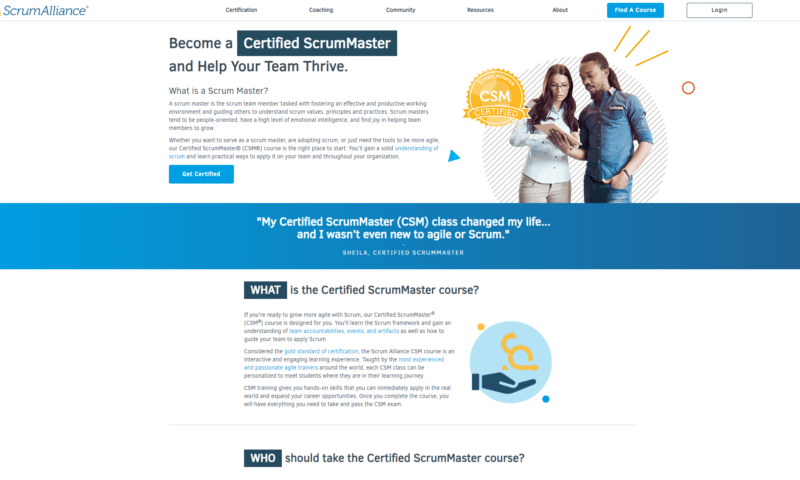
Certified ScrumMaster® (CSM®) Key Details:
- Skills Taught: You’ll learn about the scrum framework, scrum practices, team accountability, events and artifacts, and how to guide a team.
- Prerequisites: Must complete 14 hours of coursework before taking the exam.
- Price: Varies by provider, but typically $300 – $1,500.
- Course Duration: At least 14 hours of online or in-person training followed by a 60-minute exam.
- Validity: Must be renewed every two years and must earn 20 SEU (Scrum Educational Units) points.
Considered by many to be the de facto standard of training for those who want to become a scrum master, the 14-hour Certified scrum master (CSM) course offered by the Scrum Alliance could be for you. You’ll gain a thorough understanding of the scrum framework and scrum techniques, scrum events and artifacts, and how to lead a scrum team.
After the course — which runs between $300 – $1,500, depending on the trainer — participants sit for a 60-minute exam. You must correctly answer 37 out of 50 questions to pass. This course will serve you well if you plan on working in IT, manufacturing, marketing and more.
Professional Scrum Master™ (PSM™)
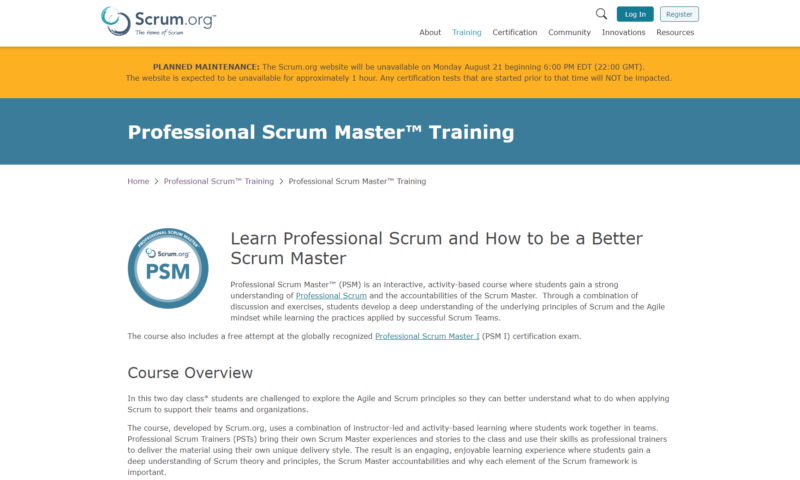
Professional Scrum Master certification.
Professional Scrum Master™ (PSM™) Key Details:
- Skills Taught: Theory of scrum and empiricism, scrum framework and values, skills and traits of a scrum master, product backlogs, interpersonal skills, forecast and release quality, risk management.
- Prerequisites: No prerequisites.
- Price: Varies by provider, but typically $995 – $1,495.
- Course Duration: Around 16 hours, plus a 60-minute exam.
- Validity: Lifetime certification — no annual renewal is required once the PSM exam is passed.
The Professional Scrum Master course, designed by Ken Schwaber’s (scrum co-founder) Scrum.org, is another highly-regarded course and certification. Individuals holding this certification should be able to find work leading scrum teams in multiple industries, like IT, public services, advertising, marketing, production and more. The PSM course costs between $995 and $1,495.
The course teaches scrum theory and application, scrum principles and values, communication skills, the importance of self-managing teams and the complexities of product delivery. Training lasts 16 hours, and there’s a 60-minute exam. If you pass, you can enroll in Professional Scrum Master II. Once complete, Professional Scrum Master III will become available.
Registered Scrum Master (RSM) by Scrum Inc.™ Certification
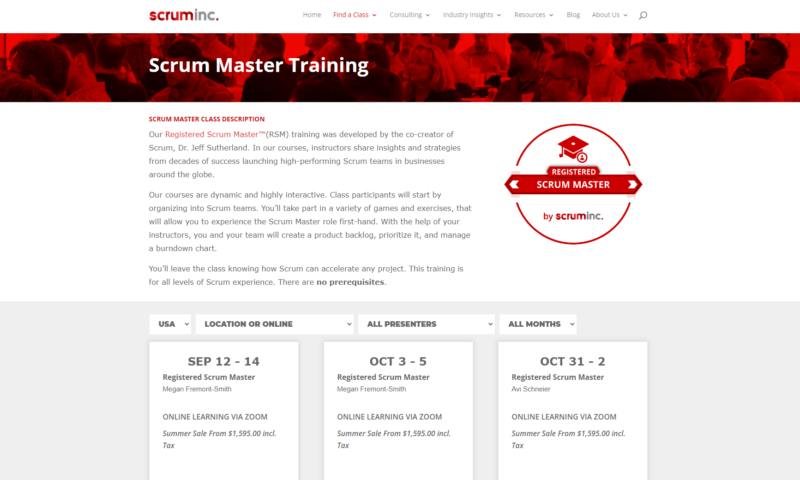
(scrum co-founder) Scrum Inc. is well-respected.
Registered Scrum Master (RSM) by Scrum Inc.™ Training Key Details:
- Skills Taught: How to lead teams in any environment, scrum values, how to create burndown charts and backlogs, prioritizing backlogs, performance improvement, Lean principles, scrum framework and an intro to a scaled Agile framework.
- Prerequisites: None.
- Price: $1,595 – $1,995 (depending on sales).
- Course Duration: At least 14 hours over multiple days, followed by a 60-minute exam.
- Validity: Must be renewed yearly, or you can pay for a lifetime certificate.
Scrum Inc., founded by scrum co-founder Jeff Sutherland, offers the Registered Scrum Master (RSM) training course and certification. The RSM course, which costs $1,995, can be taken in person or online. The course is dynamic and requires participants to demonstrate their understanding of scrum principles, framework, values, functions and Lean principles by participating in games and exercises.
Participants who complete the 14-hour multiple-day course are eligible to take the 60-minute RSM exam. This course is ideal for anyone who wants to be a master Agile practitioner in any industry.
SAFe® Scrum Master Certification
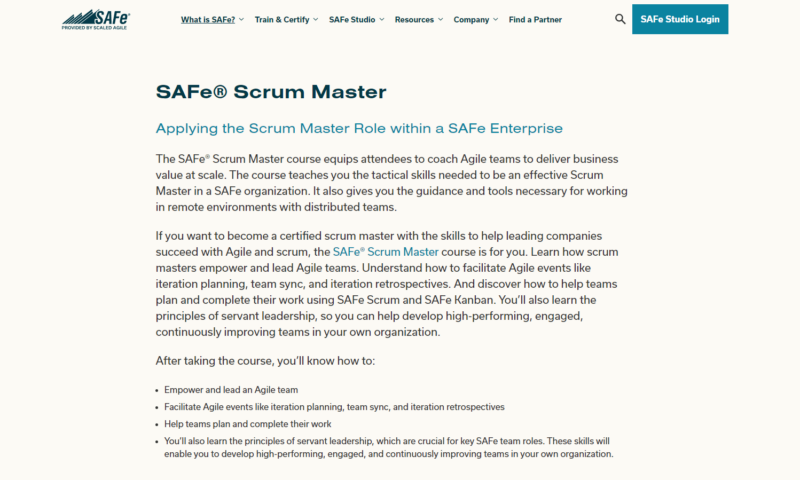
SAFe® Scrum Master Certification (SSM) Key Details:
- Skills Taught: How to facilitate scrum events, how to support PI execution, and how to coach Agile teams for constant improvement, continuous flow and delivery skills.
- Prerequisites: There are no formal requirements, but an understanding of scrum and how it works is recommended.
- Price: Varies by provider but typically between $1,000 – $1,500.
- Course Duration: At least 14 hours over two days, 90-minute exam.
- Validity: Yearly renewal ($100) is required.
The SAFe Scrum Master certification is ideal for existing scrum masters wanting to manage multiple Agile teams at an enterprise level. The two-day, 14-hour course, which costs between $1,000 and $1,500, will prepare you to facilitate scaled Agile events, plan work with SAFe scrum and SAFe kanban techniques, and teach servant leadership principles that will help you develop continuously improving teams.
To become SAFe certified, you must score 73% or greater on the 90-minute exam. The certification must then be renewed annually. If you want to be a scrum master for a company that uses scaled scrum methods (see our what is scrum of scrums guide), this is the course for you.
Advanced Certified ScrumMaster℠ (A-CSM℠)
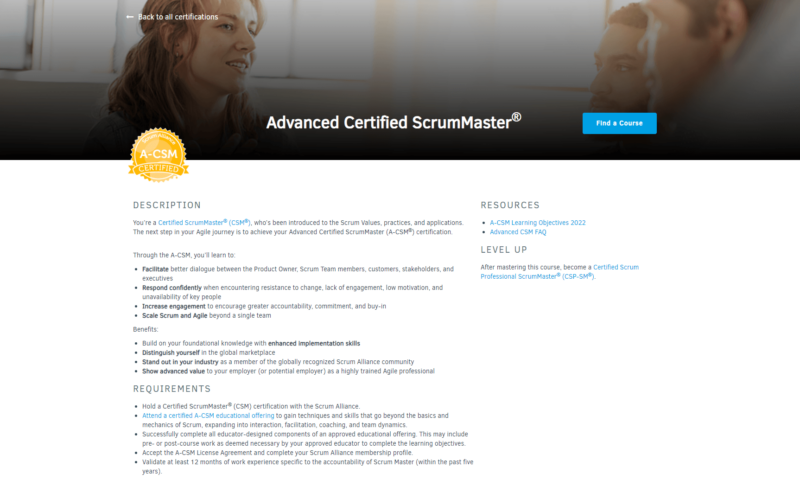
Advanced Certified ScrumMaster℠ (A-CSM℠) Key Details:
- Skills Taught: You’ll learn how to facilitate better scrum events, how to handle conflict, lack of engagement and resistance to change, how to enhance team buy-in and commitment, and how to scale scrum.
- Prerequisites: Must hold a current Certified Scrum Master (CSM) certificate. Must attend ACSM training course. Must be able to verify 12 months of work experience with a scrum master within the last five years.
- Price: Varies by provider, but generally costs between $650 – $1,200.
- Course Duration: 16 hours over two days. There is no certification exam.
- Validity: You must secure enough SEUs (Scrum Education Units) and renew certification every two years.
The Advanced Certified Scrum Master course offered by the Scrum Alliance is the perfect course for scrum masters who want to further hone and enhance their scrum skill sets. Participants will learn how to facilitate change, improve communication skills, resolve conflict, enhance engagement and team buy-in, and how to scale scrum across multiple Agile teams.
The remote course, which is ideal for scrum masters in any industry, costs between $650 and $1,200, depending on the provider. You’ll study for 16 hours and will not need to pass an exam. The certification must be renewed every two years, and you must obtain Scrum Education Units (SEUs) during the same two-year period.
Certified Scrum Product Owner® (CSPO®)
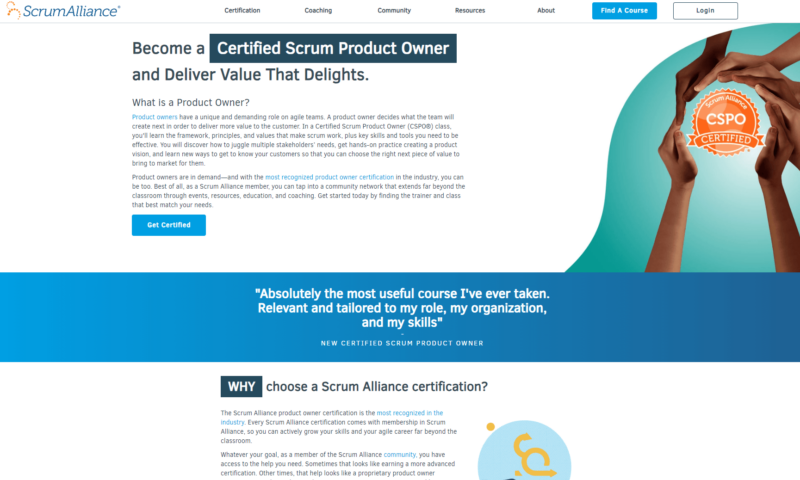
Certified Scrum Product Owner® (CSPO®) Key Details:
- Skills Taught: Understanding customers and users, competencies of product owners, goal setting and planning, validation of product assumptions and managing a product backlog.
- Prerequisites: None.
- Price: Varies by provider but typically between $445 – $900.
- Course Duration: At least 14 hours; no examination.
- Validity: 20 SEUs (Scrum Education Units) are required every two years. Certification must be renewed every two years ($100).
The Certified Scrum Product Owner course is a 14-hour introductory offering for those who wish to become a product owner or learn what this member of the scrum team does. It’s suitable for current POs who want a refresher, scrum masters, data analysts, business analysts, project managers and other team members.
The interactive CSPO course, which ranges in price from $445 to $900, teaches how to manage product backlogs. You’ll also learn how to create sprints and how to communicate the product vision and overall goal with the scrum team. There’s no exam, but you must earn 20 SEUs and renew the certification every two years.
Professional Scrum Product Owner™(PSPO)
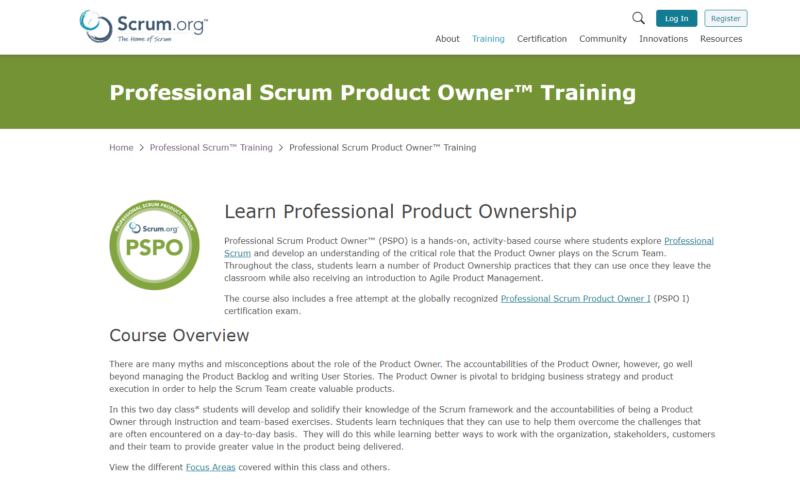
a product manager, the PSPO course could be for you.
Professional Scrum Product Owner™(PSPO) Key Details:
- Skills Taught: Product owner responsibilities. You’ll also learn about business strategies, product vision, product and sprint goals, team and stakeholder communication, product backlogs, release management, forecasting and metrics.
- Prerequisites: No requirements, but understanding scrum fundamentals will help.
- Price: Varies by provider, but typically between $999 – $1,495.
- Course Duration: 16 hours over two days.
- Validity: Must be renewed yearly
Offered by Scrum.org, the Professional Scrum Product Owner training course is an intermediate course designed for individuals with prior scrum knowledge. Participants learn about the role of the product owner and how they’re held accountable. The activity-based course also covers how to generate product and sprint goals, manage backlogs, and how to communicate with the team and stakeholders.
The course isn’t cheap. You can expect to pay anywhere from $999 to $1,495. However, the cost of the 60-minute PSPO exam, in which you must score 85% or higher to pass, is included. Once you pass this exam, you can move on to Professional Scrum Product Owner II and then PSPO III. See our CSPO vs PSPO guide for a comparison.
SAFe Product Owner/Manager (POPM)
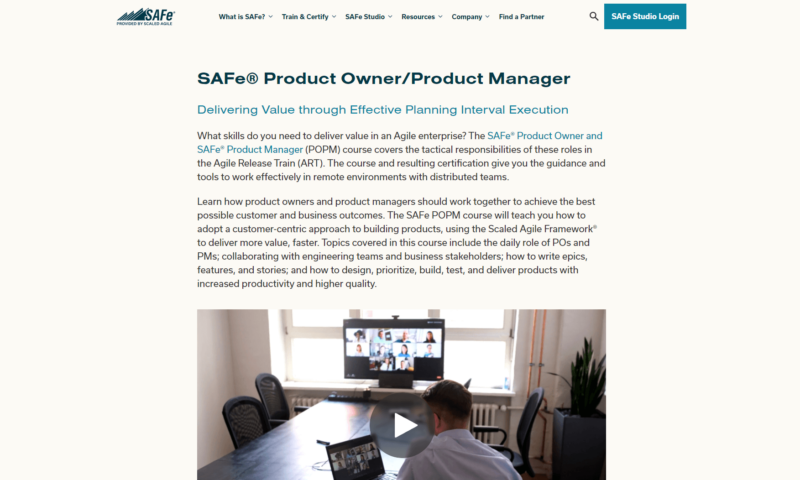
the SAFe POPM certification is for you.
SAFe Product Owner/Manager (POPM) Key Details:
- Skills Taught: How to write epics, features and stories. How to design, prioritize, build, test and deliver products. How to collaborate with engineering teams and stakeholders and how to perform the daily functions of a product owner.
- Prerequisites: None.
- Price: Varies by provider, but expect to pay between $445 – $595.
- Course Duration: 16 hours over two days.
- Validity: Must be renewed yearly.
Like the SAFe Scrum Master certification, the SAFe POPM course is designed to teach participants about how the product owner role works in a scaled environment. Like other product owner courses, the POPM course covers how to communicate with teams and stakeholders, plan, run and manage product backlogs and scrum events, and how to hone a customer-centric approach to work.
The course has no prerequisites and is affordable, with providers charging between $445 and $595. You should expect to learn for 16 hours over two days, then finish with a 90-minute, 45-question exam. You must get at least an 80% to pass. The course is ideal for aspiring product owners and anyone who wants to better understand this role in a scaled scrum team.
Certified Scrum Developer®
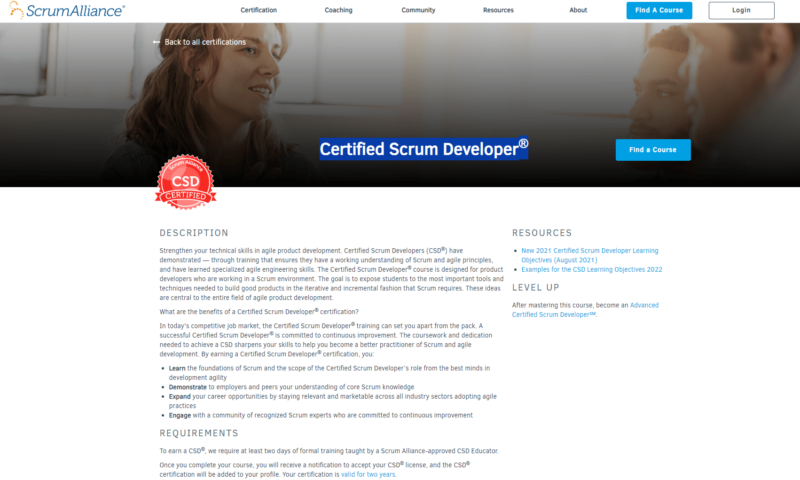
just 16 hours of instructor-led training.
Certified Scrum Developer® Key Details:
- Skills Taught: You’ll learn how to share a common language, write stories, develop features, estimate tasks, diagnose poor code, distinguish design patterns and more.
- Prerequisites: None.
- Price: Depends on the trainer, but costs are usually between $800 – $1,400.
- Course Duration: 16 hours, no exam.
- Validity: Must renew every two years and earn 20 SEU (Scrum Education Units).
Offered by the Scrum Alliance, the Certified Scrum Developer (CSD) certification shows potential employers that you have a firm grasp of scrum and Agile principles and how they affect product development. Before you can receive certification, you must attend a 16-hour course that teaches how to write stories and features, estimate tasks, identify poor code, learn a common language and more.
Once you have obtained the CSD certification, you can move on to the Advanced Certified Scrum Developer certification that will help you further your education and career. You can expect to pay between $800 and $1,400 for Certified Scrum Developer training. If you want to develop products in a scrum environment, this is the course you need.
PMI-Agile Certified Practitioner (PMI-ACP)®
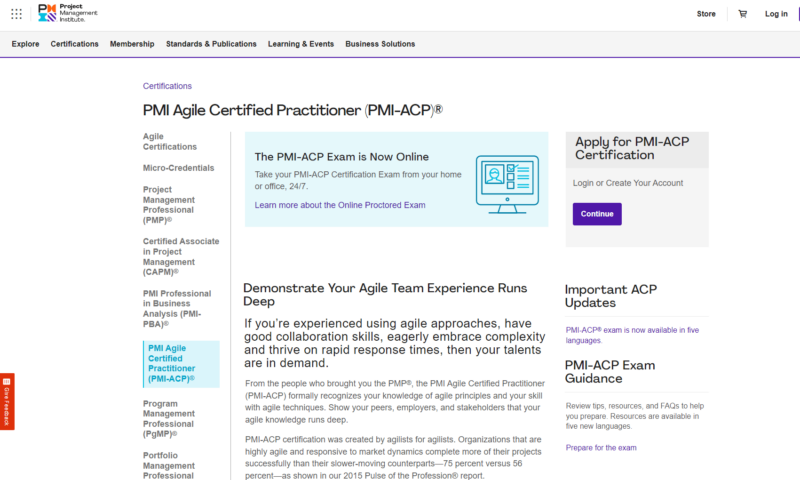
well-versed in many Agile methodologies.
PMI-Agile Certified Practitioner (PMI-ACP)® Key Details:
- Skills Taught: None
- Prerequisites: A secondary degree, 21 contact hours in Agile training, 12 months of general project experience in the past five years or a current PMP or PgMP certification, and eight months of Agile project experience in the last three years
- Price: Non-members pay $495, while members pay $435.
- Course Duration: Three-hour exam
- Validity: To maintain the certification, you must earn 30 professional development units (PDUs) in Agile topics over three years.
The PMI-Agile Certified Practitioner (PMI-ACP) certification gives you a chance to show the world that you have a robust understanding of numerous Agile principles and techniques, including kanban, Lean, extreme programming (XP), scrum and test driven development (TDD).
As per our review on the best Agile certification options, PMI-ACP is your best bet if you’re angling for a new Agile job, or your current employer is going to adopt Agile practices.
The three-hour PMI-ACP exam consists of 120 multiple-choice questions. If you want to sit for the exam, you must meet the prerequisites (listed above) and pay the Project Management Institute $495 if you’re not a member or $435 if you’re a current member.
Agile Scrum Certification by Master of Project Academy
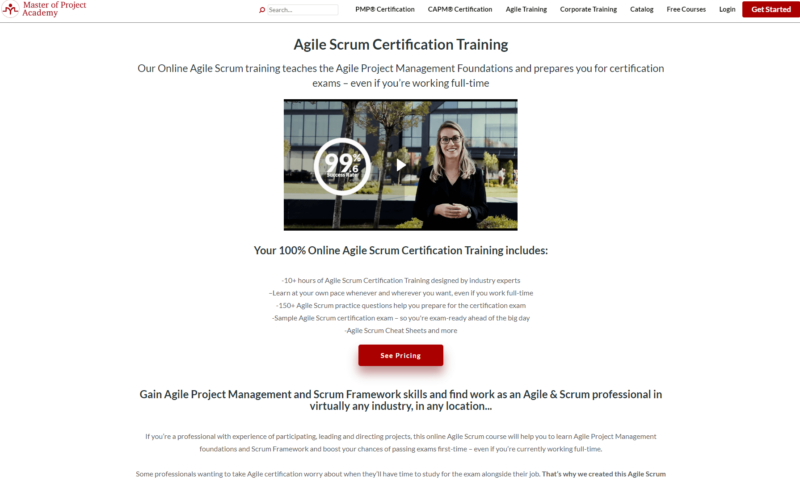
the Master of Project Academy might appeal to you.
Agile Scrum Certification by Master of Project Academy Key Details:
- Skills Taught: You’ll learn about scrum events, scrum artifacts, the scrum framework, practical implications of scrum and other Agile methodologies.
- Prerequisites: No previous project management experience or qualifications needed.
- Price: Master of Project Academy membership required. Costs $67 monthly, $297 annually or $527 for lifetime access.
- Course Duration: 10 hours.
- Validity: No renewal is needed.
Master of Project Academy’s Agile Scrum Certification is an entry-level offering that requires no previous project management experience or qualifications. If you’re looking to get started with scrum, this is the way to go. The self-paced course offers 10 hours of training that covers everything from scrum events to scrum artifacts and the scrum framework.
You need to be a member of the Master of Project Academy to access this course. You can pay monthly ($67), annually ($297) or $527 for lifetime access. Once you have joined, you can start the course. You finish by taking a final exam. The course does offer 15 Scrum Education Units (SEUs) and 12 Professional Development Units (PDUs) for PMP holders.
Benefits of Scrum Courses
Certifications are one of the best ways to show current and prospective employers that you have a solid understanding of subjects. Scrum certifications, including CSM, CSD, PSM, POPM, A-CSM, RSM and more, can teach you new skills and lead you to better jobs and higher pay rates. The certifications will also help you earn the respect of those around you.
Final Thoughts
To become the best scrum master, scrum developer or product owner, you must continue your education. The top scrum certifications we’ve listed here will help you achieve new levels of success and will help you show everyone that you have the skills needed to make a difference in scrum teams, small or scaled.
For a complete look at the difference between PSM and CSM, read our PSM vs CSM guide.
With your new knowledge and skills, you’ll be able to make a difference and earn more money while doing it. It’s a win-win situation. Have you decided which certification to go for? What made you choose one option over another? Let us know in the comments, and as always, thanks for reading.
FAQ: Best Scrum Certificate
All of the scrum certificates we’ve covered here are excellent. It’s hard to say one is better than another, as they all have pros and cons that will appeal to a wide variety of people. Look at the training methods of each and the costs involved to find the best course for you.
The Certified Scrum Manager course (CSM) offered by the Scrum Alliance is considered the de facto standard. However, the Professional Scrum Manager Certification (PSM) offered by Scrum.org is also highly respected. The two certifications are similar but do have differences regarding difficulty level, renewals and cost. Only you can decide which is better for you.
According to Zip Recruiter, individuals with the Certified Scrum Master (CSM certification) can earn anywhere from $98,000 – $150,000 per year. However, it’s hard to tell what can be made with similar scrum master certifications. In general, product owners can earn $95,000 – $144,500, while developers can earn between $72,000 – $136,000 per year.


